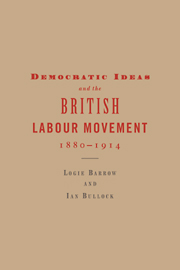3 - Democracy and the industrial struggle
Published online by Cambridge University Press: 09 November 2009
Summary
So, historians have underestimated the extent to which the ‘socialist revival’ of the 1880s was influenced by concerns – reminiscent of Chartism – with constitutional and electoral reform. Thus, aspirations for democracy remained no less central to socialism than the apparently more novel aims of social and economic transformation. We will now see that an analogous mix of ‘old’ and ‘new’ was to be found in the trade unions. Thus, there was not simply ‘Old’ (craft) unionism versus ‘New’ (unskilled) unionism, or even established ‘moderation’ versus socialistinfluenced militancy. There was also the appearance of seemingly new but in fact old dreams of effective industrial unity.
These usually meshed with the belief that the old, particularistic, structures of the trade union movement served the interests of leaderships and officials better than – or even rather than – those of the membership: the ‘rank and file’ of militant rhetoric. We have already found SDF, Socialist League and Clarion socialists systematically assuming that greater democracy and full-blooded socialism were but two sides of the same coin. We will now find their union equivalents – not infrequently the same individuals – seeing anything but conflict between maximising democratic control of the movement and propelling it into more effective action.
There was an important difference between the industrial and political arenas. Trade union action, being a matter of the most direct and immediate concern for those involved, had far less room for postponing any potential conflict of aims.
- Type
- Chapter
- Information
- Publisher: Cambridge University PressPrint publication year: 1996

